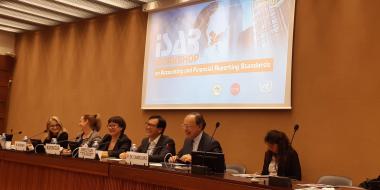CDSB's Communications Manager, Lesley McKenna shares key takeaways and resources from the successful workshop as part of ISAR 36.

On October 29, the Climate Disclosure Standards Board (CDSB) in association with UNCTAD and the Sustainability Accounting Standards Board (SASB) hosted the UNCTAD-ISAR Workshop on practical implementation of climate-related financial disclosures and their relationships to the SDGs.
CDSB has since received many requests from both the delegates and those who couldn’t attend to share the materials discussed and the key findings. For your convenience, I’ve outlined the highlights and linked to all materials below.
Patrick de Cambourg, President, Autorité des Normes Comptables (ANC) set the scene for the day by delivering the keynote speech on the challenges of relevant and reliable non-financial information. This emerged as one of the key themes throughout the day and he proposed the way forward as a targeted system in four pillars:
- Definition of the general framework;
- Definition of substantive standards;
- Definition of presentation standards;
- Definition of the accountability framework.
The opening session was followed by a panel with Charlotte Gardes , DG Trésor; Chiara del Prete, EFRAG and Thomas Verheye, European Commission. The spotlight was firmly placed on the role of regulation as a driver for implementing the TCFD recommendations and the enabling conditions needed to accelerate comprehensive, comparable and high-quality disclosures. Here Mr. Verheye highlighted how a credible green deal requires a strong green finance strategy, but the distance to the target pathway is not yet credibly defined.
The afternoon session kicked off with insight into successful approaches to integrating climate-related risk and opportunity into reporting practices. Richard Martin, ACCA and Mario Abela, WBCSD were joined by Manjula Chumman from Tesco who presented Tesco’s TCFD roadmap.
The feedback during the training sessions by CDSB on practical guidance for implementing the TCFD recommendations served up plenty of food for thought. Implementation challenges put forward by the international participants included difficulties in securing buy-in at senior level, and lack of understanding or “will” from the Board to take action.
Those representing developing nations emphasised the need for increased training and education. Additionally, representatives from Latin America spoke of the difficulties for SMEs, which represent over 90% of all enterprises. Given the financial and resource constraints they face, there was a strong call for better consideration of the applicability of the TCFD recommendations and increased training and support for reporting on and adapting to climate-related financial risks and opportunities. Coupled with the competing priorities from a governance perspective, questions arose about how climate risk can be effectively communicated as a strategic risk so that it rises to the top of Board agendas.
Training also focused on first steps for implementation. There was consensus that starting with qualitative and then moving to quantitative disclosures was a practical first step. Moving away from working in departmental silos was also brought to the fore.
Bringing the day to a close, Mardi McBrien, CDSB; Tatiana Krylova, UNCTAD and Madelyn Antoncic, SASB discussed the harmonisation of TCFD and SDG reporting and the synergies between the TCFD recommendations and UNCTAD’s Guidance on Core Indicators.
The global indicator framework, established by the Inter-Agency and Expert Group on Sustainable Development Goal Indicators, monitors the implementation of the SDG agenda based on comparable and standardised national data. Company reporting is therefore an important data source and ties into SDG 12 on sustainable consumption and production. Target 12.6 encourages organisations to integrate sustainability information into their reporting cycles, while indicator 12.6.1 requires data on the number of companies publishing sustainability reports.
Several of the SDG indicators refer to data that is already being provided by many organisations in their reports such as energy use, water use and carbon emissions. By increasing the quality, reliability and comparability of TCFD aligned disclosures, this data can contribute to enhanced SDG monitoring and reporting on climate and environmental information. The panel also discussed how the core indicators can help facilitate practical implementation of climate-related reporting through baseline indicators as a starting point.
The workshop came to a close with a debate on the growing likelihood of mandatory disclosure as a key driver to incentivise more effective corporate reporting and to drive the consistency, comparability and reliability of disclosure.
Useful links and resources
Given the workshop’s focus on practical guidance to support the adoption of climate-related financial disclosures, I've provided a list below of the various resources that were referred to throughout the workshop.
- All speaker presentation can be view here (Scroll down to 29 October UNCTAD-ISAR Workshop): https://isar.unctad.org/presentations/
- Guidance on core indicators for entity reporting on contribution towards implementation of the Sustainable Development Goals: https://unctad.org/en/pages/PublicationWebflyer.aspx?publicationid=2469
- The TCFD Good Practice Handbook: www.cdsb.net/tcfdhandbook
- The TCFD Implementation Guide: www.cdsb.net/tcfdguide
- TCFD Getting Started Checklist: www.cdsb.net/checklist
- UK Green Finance Strategy: https://www.gov.uk/government/publications/green-finance-strategy
- Better Alignment Project report: https://corporatereportingdialogue.com/publication/driving-alignment-in-climate-related-reporting/
- Climate-related financial disclosure online courses: https://learn.tcfdhub.org
- The TCFD Knowledge Hub: tcfdhub.org
- TCFD Second Status Report: https://www.fsb-tcfd.org/publications/tcfd-2019-status-report/
- Ensuring the relevance and reliability of non-financial corporate information: an ambition and a competitive advantage for a sustainable Europe: anc.gouv.fr/files/live/sites/anc/files/contributed/ANC/4.%20Qui%20sommes-nous/Communique_de_presse/Report-de-Cambourg_extra-financial-informations_May2019_EN.pdf
If you would like learn more about our TCFD practical implementation workshops or are interested in partnering with us, please do get in touch by email: